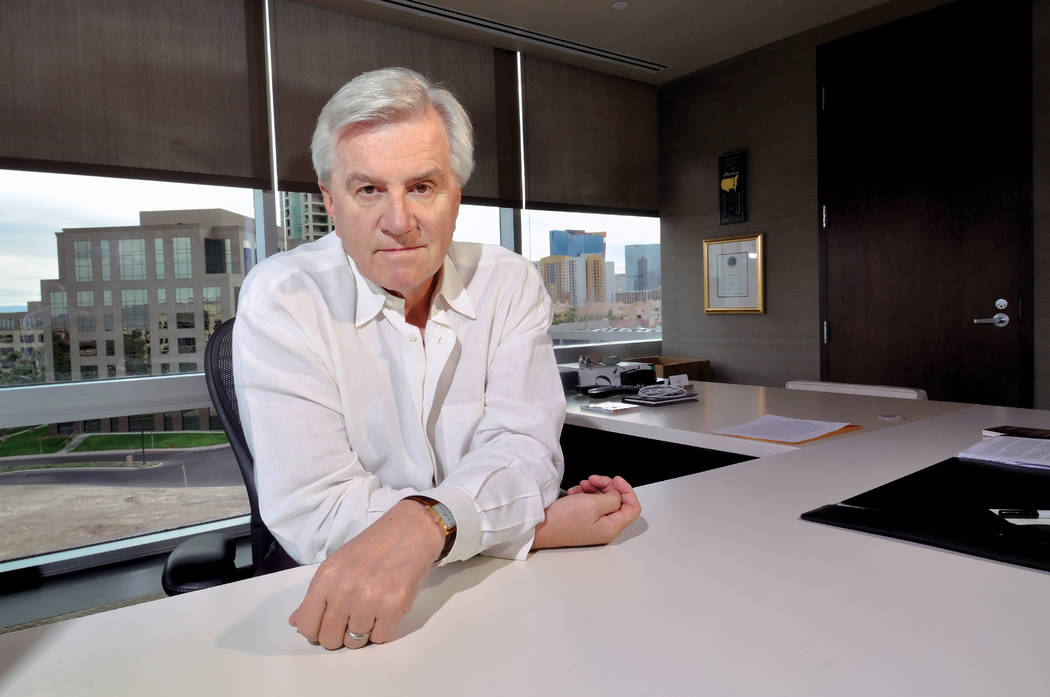STEVE SEBELIUS: Rogich returns to diplomacy
Against the backdrop of tariffs, “easy-to-win” trade wars and bellicose twitplomacy, it’s not the best time to be in the international diplomacy business.
Yet, longtime Republican consultant Sig Rogich isn’t dissuaded. In fact, he’s glad to be part of a group seeking to better diplomatic relations with one of the United States’ biggest competitors and potential adversaries: China.
Rogich, chairman of the U.S.-China Transpacific Foundation, just returned from leading a delegation to China to discuss a host of issues, including intellectual property, freedom of navigation, trade and tariffs and Hong Kong.
“We came away knowing that we need each other,” Rogich said. “These two hemispheres need to coexist for the good of the world.”
Yes, the recent unpleasantness over tariffs came up during the September trip, but China doesn’t see President Donald Trump’s rhetoric or imposition of import duties as part of a trade war, Rogich said. “They don’t think it’s a trade war right now. They think it’s a numbers thing. … They view it as a negotiation, dollars and cents.”
And, of course, Trump was the subject of conversation. Chinese leaders don’t think they can simply wait out a Trump presidency to avoid dealing with trade issues and realize they may have more to lose if a Democratic president takes office who is more focused on human rights, the recent troubles in Hong Kong and similar issues.
The delegation was co-chaired by former Connecticut Sen. Joe Lieberman, the Democratic nominee for vice president in 2000. Others in the group included former Assistant Secretary of State Stephen Rademaker; Randall Rader, former chief judge for the Court of Appeals; former Energy Secretary and New Mexico Gov. Bill Richardson; former Rep. and Ambassador Tim Roemer; and former Rep.-turned-lobbyist Billy Tauzin.
The group met with counterparts from China, including Wang Chao, president of the Chinese People’s Institute of Foreign Affairs; Zhou Wenzhong, former Chinese ambassador to the United States and China’s former vice foreign minister; Gen. Chen Xiaogong, former deputy commander of the air force of the People’s Liberation Army; and Zhao Weiping, vice president of the Chinese People’s Institute of Foreign Affairs.
The trip was part of what’s known as “Track 2” diplomacy, which is conducted by private citizens with the knowledge and endorsement of the U.S. government but outside official channels. (Lieberman did brief Secretary of State Mike Pompeo after the September trip, however, and the delegation met with current U.S. Ambassador to China Terry Branstad while in the country.)
Rogich said the meetings are helpful to both sides and often include frank discussions of issues of concern to both countries. The American delegation was able to reassure China that the United States was not behind recent unrest in Hong Kong sparked by a law that would have allowed extradition and trials in mainland China, for example. It was also able to convey the U.S. concern about China’s insistence on creating artificial islands with military installations in the South China Sea that have also rankled Japan, Vietnam and Australia.
“It was a very candid conversation. We didn’t pull any punches, really,” Rogich said.
In a time of sometimes chaotic foreign policy conducted by a sometimes-unpredictable president, the back-channel visits of unofficial delegates can be useful in addressing problems that exist and avoiding future ones. The Chinese government hosted delegates at the equivalent of the White House in Washington.
“They think it’s important. It’s dialogue,” Rogich said. “I’ve learned that they realize we need to coexist.”
The trips are also good for Las Vegas: Among the topics were Chinese visitation to Las Vegas, direct airline flights between various Chinese cities and Southern Nevada and improving tourism. The topic of partnerships between UNLV and Chinese universities also came up.
The group also discussed counterterrorism, energy, limiting greenhouse gases, health care and new lifesaving medications developed in the United States, as well as agriculture. “Growing food transcends walls and barriers,” Rogich said. “People need to eat.”
And, of course, respecting intellectual property laws was a topic of conversation, too. “They’re starting to understand there’s a world rule for these things,” Rogich said.
This isn’t Rogich’s first trip to China. An aide to former President George H.W. Bush, Rogich accompanied the ex-president on a trip to China in 1998.
And it’s also not his first foray into diplomacy: Bush appointed Rogich as his ambassador to Iceland in 1992, where Rogich served briefly before returning to the United States to work on Bush’s unsuccessful re-election campaign.
The meetings have been successful enough to continue: Rogich said a Chinese delegation is expected to meet in the United States next year. And while the two sides may not agree on everything, it’s still important to continue talking, even — and perhaps especially — with America’s global rivals.
Contact Steve Sebelius at SSebelius@reviewjournal.com or 702-383-0253. Follow @SteveSebelius on Twitter.























